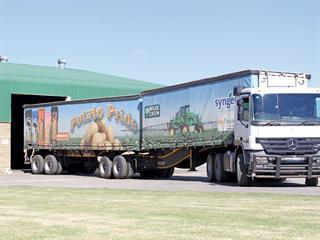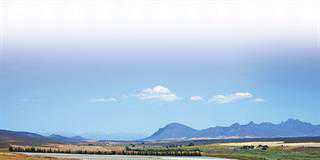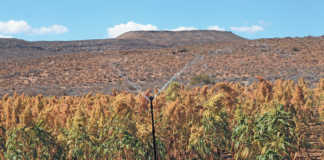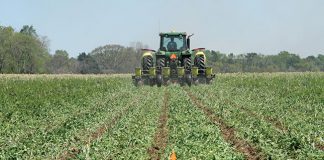
It is late October and one can sense Stephan Fourie’s urgency because the first rain has just fallen, so he must plant, and fast.
“We had to wait for rain before we planted the maize,” he says, adding that by this time last year, the seed was already in the ground. Despite his urgency about the maize, he is more concerned about the 200ha to 220ha potatoes he plants every year.
Stephan, who farms on Leeuwbank with his father-in-law, Michael de Klerk, and brother-in- law, Emile de Klerk, has been producing potatoes for seven years under the Potato Pride brand. He launched this enterprise after identifying them as the most suitable crop to diversify their farming operation.
Stephan planted 55ha to potatoes in the first year and 125ha in the second. This grew to 195ha in the third year and eventually to the current 200ha to 220ha, the optimal for the farm. The crop is grown under irrigation, but Stephan is looking into dryland potatoes for the future and has already started preparing the land.
Stephan has not always been a farmer. He studied B. Com (Accounting) on a part-time basis through Enslins Frankfort Geoktrooieerde Rekenmeesters SA, where he completed his articles. Then in 2006, Michael presented him with the opportunity to farm.
The beginnings
Before he started, Stephan spent time with Gerhard Posthumus from Wesgrow to learn about the potato industry. “We also source all our potato seed from Wesgrow,” he explains. Wesgrow’s seed is now the key to Stephan’s production plan. “I buy only elite Generations 3 and 4 certified seed from Wesgrow,” he says.
The National Potato Certification Scheme accepts a virus load of 5%. The seed Stephan buys has a virus load of 2,5%, which makes the risk of a viral disease almost non-existent.

Stephan Fourie farms potatoes on the farm Leeuwbank in Frankfort with his father-in-law, Michael de Klerk, and brother-in-law, Emile de Klerk.
Despite the low disease risk, Stephan sprays Syngenta potato pack to ensure the crop stays healthy. This programme contains chemicals that control fungi and insects during the growth phase. He sprays it every seven days within 12 weeks to 14 weeks.
Generation 3 seed costs R206/bag while Generation 4 seed costs R180/bag, with 250 tubers per bag. The farm plants around 170 bags/ ha for a plant population of 42 500/ ha. Potato input cost are high, with R130 000/ha to R150 000/ ha not being uncommon. However, the farm averages a yield of 75t/ha.
No shortcuts
“The high input costs make it a high-risk crop without room for shortcuts. That’s why we are quality-driven. If we get poor quality, we still have to pay the input costs. Currently, the prices of diesel, seed and fertiliser are a major factor,” he explains.
Despite these challenges Stephan remains positive.
“This is what makes me proud,” he says, standing between potato plants with arms widespread. “Looking at this and seeing what we’ve accomplished.”
Syngenta Award
Stephan’s pride and passion may also be the reason he received the 2015 Syngenta Potato Farmer of the Year award. “It was a surprise to receive the award. It’s a great honour. I think I received it because we are a tight team with a passion for farming,” he says.
Stephan believes that their technological approach also helped the business to scoop the award. Leaf samples are taken every week and they use the Metos Field Climate Host, imported from Austria, to link irrigation to real-time soil moisture levels and data projections. It incorporates a special potato disease monitoring system with a ‘leaf wetness’ function that determines the likelihood of certain diseases developing.
“We then irrigate according to these data to keep the soil moisture optimal,” he explains..
“The methods we employ and the technology we use are cutting edge. We use the best machinery and implements available.”
Oil sampling, conducted on a 100m x 100m grid, yields the samples which they then send to Ohio in the US for analysis. “We have them tested for micro-elements and apply corrections according to the results and with help from fertiliser consultant and suplier, Multi Green,” he explains.
Potato Pride uses only consumer-friendly agrochemicals and avoids toxic ones such as EDB and Temik. It also uses Potatoes SA’s ‘electronic potato’, a device that is put through the Potato Pride packing system and ends up bagged with the potatoes. The data is then analysed to see where damage may be a problem.
John Deere’s AutoTrac system places the seed potato tubers 20cm apart to ensure 42 500 potato plants per hectare. This system also makes accurate spray tracks to prevent the sprayer from damaging the ridges that can in turn, affect yield and quality.
“We try to keep our management standard high to get to where we want to go. We have our hands and knees in the soil and believe that we have to be personally involved in everything for a successful crop.”
Planning ahead
Stephan says that he has to plan ahead for a successful harvest. “Planting sections at two-weekly intervals allows me to harvest every two weeks. Potatoes that stay in the ground for too long lose quality. Planting this way means I can harvest high-quality potatoes throughout the season.”
Stephan starts planting in mid-August and continues at two-week intervals for five months thereafter. Harvesting starts in the second week of January for a six-month season.
Workers from the community
Although the field work is highly mechanised, Leeuwbank employs approximately 120 workers in the packhouse. “They’re from the small community of Oranjeville and our packing facility is 2km outside town,” says Stephan. “At least 95% of the workers have been with us since we started six years ago, and are passionate about what they do.”
Stephan is not keen to mechanise completely. “People say labour is expensive but I have a responsibility towards our workers. I want to plough something back into Oranjeville. The work puts food on their tables and clothes on their children. There are 120 families who depend on the work they do with us. For at least six months a year, we can provide for them.”
Soil health
The farm currently has 1 200ha under centre-pivot irrigation on a five-year rotation with maize, wheat and soya beans as rotation crops.
“Crop rotation keeps our soil sustainable,” Stephan says. “We have high-quality white sandy soil with a low clay content. It produces beautiful and spotless white skin potatoes – ideal for the local market where appearance matters. At the end of the day, quality sells.”
Even when disaster strikes, the focus must be on quality and good management helps you achieve this.
“We suffered extensive damage one year when 300mm rain fell during January and February,” he recalls. “The soil can absorb a lot of water, but eventually becomes waterlogged. We had rot. With quality being our aim, I explained to the buyers what had happened.
“We maintain a good relationship with them. Our market agent Botha & Roodt once brought a bus load of 40 people – buyers, agents and supermarket agents – to the farm where we showed them how our operation worked. It helped them to see how we handle the product they buy and to understand the production process as well as what can go wrong.”
The brand
Two brands feature under the Potato Pride umbrella. Lion’s Pride is the first-grade prepack while the second-grade is called Africa’s Pride. “We supply the whole range, from baby potatoes to large sizes,” Stephan says. “Every size has a distinctive, brightly coloured bag. I want our potatoes to stand out and to be easily distinguishable.”
Transport challenges
Stephan explains that they transport their own produce in branded trucks as part of their marketing and brand awareness strategy. “It’s a lot cheaper to deliver our own product as we are 100km away from the Johannesburg market. But we use Tri-Logistics to send potatoes to Durban or Cape Town. Hiring a truck will cost around R1,80/bag to R2/ bag, but depending on the destination and route, may be as much as R2,50. A truck carries 3 520 bags.”
Water is also a challenge. Although the Vaal Dam pushes up to the farm and the Wilge River is close by, water quality is an issue. Furthermore, with the dam level declining, the effect of the drought is becoming evident.













